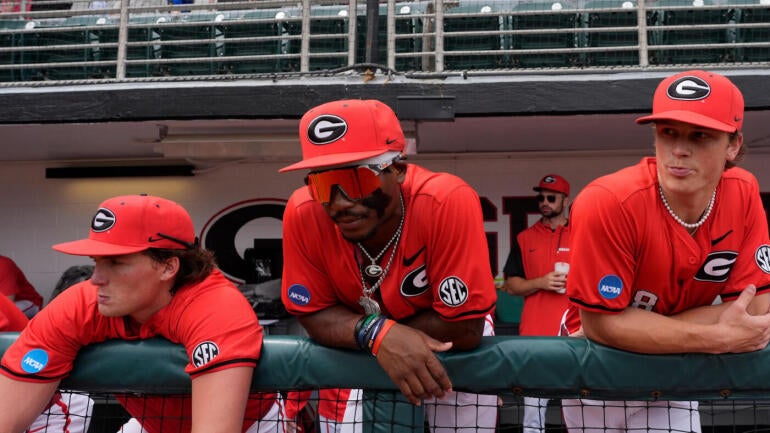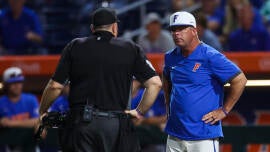What went wrong for the top SEC teams who bowed out of NCAA regionals? How No. 1 Vanderbilt, No. 2 Texas fell
Though the SEC had four teams advance to the super regional round, some of its top squads dropped out in the regionals

The SEC made the wrong kind of history in the regional round of the NCAA Baseball Tournament. After placing an NCAA record 13 programs in the 64-team field, nine were eliminated in the opening weekend of action.
That includes No. 1 Vanderbilt -- the SEC Tournament champion -- who was the first top overall national seed to not make a regional final since the NCAA Tournament adopted its current format in 1999, and No. 2 Texas, which won the SEC regular season crown in its first year with the conference. This is the first time since 2008 that neither the Nos. 1 or 2 national seeds advanced to the super regional round.
No. 7 seed Georgia and 10-seed Ole Miss were also forced into an early exit from the tournament even though they hosted their own regionals. That's not to mention teams like 6-seed LSU, which lost its first regional final game against a Little Rock team that finished the regular season with 19 wins. The Tigers were able to just eke out a 10-6 win, after initially falling behind 5-1, Sunday night to save their season.
Non-national seeds with high hopes like Alabama and Florida didn't make it very far, either. Four SEC teams -- No. 3 Arkansas, No. 4 Auburn, LSU and No. 14 Tennessee -- still secured a spot in the super regional round, which is second among conferences to the ACC's five, but it's hard to call the SEC's regional performance anything but disappointing.
So what went wrong with some of the SEC's top teams?
No. 1 Vanderbilt's offensive inconsistency
It's easy to blame Vanderbilt's early exit on one play. In the top of the ninth inning, shortstop Rustan Rigdon roped a two-out hit that hopped over Vanderbilt's outfield fence for a ground-rule double. As a result, just one of the two runners the Commodores had on base scored, cutting Wright State's lead to 5-4. Had the ball remained in play, there's a strong chance Mike Mancini could have scored from third. Instead, the 'Dores plated one run and RJ Austin popped an out into the air on the next at bat. Those are the breaks when you play on springy artificial turf.
But really, that ninth inning in the elimination game was a microcosm of the issue that plagued Vanderbilt all weekend: horrible offensive inconsistency. Earlier in that same inning, Mancini singled to center field with the bases loaded. That was Vanderbilt's first hit with runners in scoring position in the regional. The Commodores batted .132 and left 19 runners on base in their three games. They also had more strikeouts (23) than hits (12). Austin and Jonathan Vastine, two players that Vanderbilt really needed to deliver, were a combined 0-for-21 with seven strikeouts at the plate. It was stunning to see from an offense that brought at least five runs across in seven of its eight games entering the tournament.
No. 2 Texas runs out of gas
I wrote before the regional round began that Texas' pitching should be fine, even without injured ace Jared Spencer. That was incorrect. After shutting down Houston Christian in the opener, the Longhorns allowed at least seven runs in each of the next three games. Not all of them were earned -- notably, shortstop Jalin Flores had a couple of costly errors in the first game against UTSA that led to runs -- but it was a forgettable weekend for Texas' arms. Luke Harrison and Max Grubbs got tagged for four earned runs in game one versus UTSA. Ethan Walker, who had a solid outing against Tennessee in the SEC Tournament, allowed the Roadrunners to put four on the board in the regional final. Texas' bats weren't able to keep up with the pitching downturn and the crucial defensive mistakes.
No. 7 Georgia draws tough matchups
Sometimes, even nationally seeded teams get a tough draw. Entering the NCAA Tournament, Georgia ranked 11th in the SEC with a .260 batting average against left-handed. So, naturally, the fates aligned to place two teams -- Duke and Oklahoma State -- stocked with lefties in the Athens Regional. Duke threw three straight southpaws at Georgia in its 6-3 win over the Bulldogs. Georgia actually tagged Oklahoma State LHP Harrison Bodendorf for seven earned runs -- the most he's given up in a start this season -- but lefty reliever Drew Blake entered late and settled things down by retiring four of the five batters he faced. Blake's steady hand allowed Oklahoma State to score four runs in the bottom of the ninth, including a 2-run home run from Brock Thompson that ended the game and sent Georgia home early.
No. 10 Ole Miss' starting pitching lets it down
Most expected an offensive explosion in the Oxford Regional. It delivered. Ole Miss played Murray State three times in the Oxford Regional and outscored the Racers by a combined score of 36-29. The Rebels went 1-2 and, ultimately, were eliminated from the tournament Sunday evening in a 12-11 loss. Though they almost executed on an inspiring late-game rally, they were ultimately let down by poor pitching and lackluster defensive performances throughout the entire weekend.
In that ultimate showdown against Murray State, the Racers jumped out to a 12-3 lead. They got five earned runs off of starter Walker Hooks and at least one earned run off of two of the three relievers to enter the game when Hooks was pulled after 2.1 innings. In Ole Miss' two losses to Murray State, it starters allowed a combined 14, nine earned runs and retired just 16 of 33 batters faced while logging four strikeouts. That put Ole Miss in some early holes that it was unable to dig out of.
Alabama can't deliver in crucial moments
Alabama was in the discussion to host a regional and just missed out on a national seed despite ranking 13th in RPI when the NCAA Tournament selection show rolled around. The Crimson Tide were my pick to make it out of the Hattiesburg regional. Instead, they went 0-2 for a second consecutive year while coming up just short in some crucial moments. In May 30's loss to Miami, Alabama outfielder Kade Snell hit a long ball that died just short of the outfield wall in the bottom of the ninth inning. Had it carried just a few feet more, it would have been a decisive 3-run home run. Instead, the Tide fell 5-3.
Then, the next day against host Southern Miss, Alabama imploded in the bottom of the eighth inning. Braylon Myers was replaced by Carson Ozmer after allowing a leadoff home run. Ozmer subsequently hit a batter, walked another and then surrendered a single to right center that brought two runs around and handed Southern Miss a 6-5 lead. In the top of the ninth, Alabama loaded the bases with two walks and a single but star shortstop Justin Lebron struck out and center fielder Richie Bonomolo Jr. sent a groundout to third to end the rally and Alabama's postseason run.
Florida's poor pitching development catches up to it
Florida has consistently ranked among the worst pitching teams in the SEC over the past couple of years, so it shouldn't be surprising that the Gators' arms let them down in their two losses to East Carolina. Starters Liam Peterson and Pierce Coppola went a combined 3.1 innings before they were chased off the mound in their respective starts against the Pirates. In comparison, East Carolina ace Ethan Norby pitched 7.1 innings and fanned 10 batters while allowing just three runs in his Game 1 start against the Gators. The bullpen shouldn't get let off the hook either.

Florida's relievers allowed a combined 12 earned runs in two losses against ECU. The entire weekend was an abject disaster for Florida on the mound, and it underscored the lack of pitching development and depth that the Gators have dealt with in recent seasons.
![[object Object] Logo](https://sportshub.cbsistatic.com/i/2020/04/22/e9ceb731-8b3f-4c60-98fe-090ab66a2997/screen-shot-2020-04-22-at-11-04-56-am.png)
























